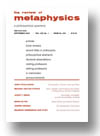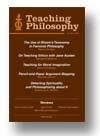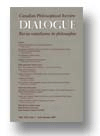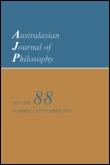
Diametros
Scope & Guideline
Cultivating a vibrant community of philosophical minds.
Introduction
Aims and Scopes
- Philosophy and Ethics:
The journal focuses on philosophical inquiries into ethics, including discussions on free will, punishment, and justice, exploring their implications for contemporary society. - Social Research Ethics:
Diametros places a strong emphasis on the ethical considerations in social research, particularly in multilingual and multicultural contexts, addressing issues such as participant vulnerability and ethical review processes. - Medical Ethics and Law:
The journal explores the ethical dimensions of medical practices, therapies, and regulations, investigating the complexities surrounding informed consent, experimental therapies, and healthcare priorities. - Interdisciplinary Approaches:
It encourages interdisciplinary research that bridges philosophy, sociology, law, and medical ethics, fostering a comprehensive understanding of contemporary ethical dilemmas. - Political Philosophy:
The journal examines political concepts such as justice, authority, and libertarianism, often discussing their philosophical foundations and implications for social policies.
Trending and Emerging
- Non-Punitive Justice:
An increasing focus on non-punitive approaches to justice highlights a growing interest in restorative practices and ethical considerations in criminal justice reform. - Ethics in Medical Innovation:
The journal has seen a rise in discussions about the ethics of advanced medical therapies and innovations, reflecting ongoing debates about the implications of biotechnology and healthcare access. - Language and Multilingualism in Research:
There is a notable trend towards exploring the role of language in ethical decision-making and research practices, emphasizing the complexities of conducting research in multilingual contexts. - Autonomy and Agency:
Emerging discussions on autonomy and agency, particularly in relation to medical ethics and social research, reflect a contemporary concern with individual rights and ethical responsibilities. - Philosophical Reflections on Social Issues:
A growing trend in applying philosophical inquiry to pressing social issues, such as healthcare disparities and ethical implications of public health policies, underscores the journal's commitment to relevance.
Declining or Waning
- Traditional Libertarianism:
Discussions centered on classical libertarian principles have diminished, suggesting a shift towards more nuanced explorations of ethical frameworks and social justice. - Historical Philosophical Figures:
Analysis focused on historical philosophers, such as Kant and Spinoza, has decreased, indicating a potential move away from historical debates towards contemporary ethical issues. - Utilitarianism:
While utilitarianism remains a significant ethical theory, its application in healthcare discussions has waned, signaling a growing preference for alternative frameworks such as prioritarianism. - Theoretical Philosophical Debates:
Engagement with abstract theoretical debates, such as those surrounding the metaphysics of consciousness, has reduced, reflecting a trend towards practical ethical applications in real-world contexts.
Similar Journals

PHILOSOPHIA
Navigating the Landscape of Philosophical ThoughtPHILOSOPHIA is an esteemed academic journal published by Springer, focusing on the diverse field of philosophy. With an ISSN of 0048-3893 and E-ISSN 1574-9274, this journal serves as a prestigious platform for innovative philosophical discourse and research. Based in the Netherlands at VAN GODEWIJCKSTRAAT 30, 3311 GZ DORDRECHT, PHILOSOPHIA has garnered a reputation for its high-quality contributions, maintaining a Q1 classification in Philosophy and ranking 229 out of 806 in the Scopus Arts and Humanities category, placing it within the top 71st percentile. The journal's scope spans critical analyses and contemporary debates, making it an essential resource for philosophers, scholars, and students seeking to engage with cutting-edge ideas. Although it does not currently offer open access, its rigorous review process and academic integrity ensure that published articles are of the highest scholarly standard. With its convergence of contributions since 1971 and ongoing commitment to advancing philosophical inquiry, PHILOSOPHIA remains pivotal in shaping both theoretical and practical understandings within the discipline.

RUSSELL-THE JOURNAL OF THE BERTRAND RUSSELL STUDIES
Deciphering the Philosophical Threads of Russell's WorkRUSSELL - THE JOURNAL OF THE BERTRAND RUSSELL STUDIES, published by Johns Hopkins University Press, is a prominent scholarly platform dedicated to the exploration and analysis of the philosophical contributions of Bertrand Russell. With an ISSN of 0036-0163 and E-ISSN 1913-8032, this journal serves as an essential resource for researchers and students in the field of philosophy, particularly those interested in modern philosophical thought and Russell's lasting impact. Although it operates under a traditional subscription model, it remains a crucial publication within its quadrant, ranking in the 21st percentile among its peers and classified in the Q4 quartile for 2023 in the Philosophy category. Covering a time frame from 2002 to 2024, the journal showcases a wealth of contemporary literature, critical essays, and discussions that propel the conversation around Russell's theories and their implications in today's philosophical inquiries. As an established journal in Canada, it presents a unique opportunity for academics and enthusiasts alike to engage with Russell's work and its relevance to both historical and contemporary debates in philosophy.

Acta Philosophica
Contributing to the Legacy of Philosophical ScholarshipActa Philosophica is a prestigious academic journal dedicated to the exploration and analysis of philosophical thought. Published by Fabrizio Serra Editore in Italy, this journal serves as a vital platform for scholars, presenting rigorous research that contributes to the field of philosophy. With an ISSN of 1121-2179 and an E-ISSN of 1825-6562, Acta Philosophica is indexed in prestigious databases, enhancing its visibility and impact within the academic community. Active since 2011, this journal has emerged as a significant player in the discipline, currently positioned in the Q3 quartile for Philosophy in 2023 and ranked #557 among 806 journals in the Arts and Humanities category on Scopus, placing it in the 30th percentile. Researchers and students alike will find valuable insights within its pages, as it covers a broad spectrum of philosophical inquiries. Although not an open-access journal, its rich content makes it essential reading for anyone invested in advancing philosophical discourse.

REVIEW OF METAPHYSICS
Elevating philosophical studies with timeless insights.REVIEW OF METAPHYSICS is a distinguished journal published by PHILOSOPHY EDUCATION SOC, INC, dedicated to advancing scholarly discourse in the field of philosophy. With an ISSN of 0034-6632 and an E-ISSN of 2154-1302, this journal has been a crucial platform for philosophical inquiry since its inception in 1975, converging its rich content from 1992 and continuously serving the academic community up to 2022. Based in the United States, specifically at 223 Aquinas Hall, Catholic University America, Washington, DC, it has secured a reputation for quality, reflected in its placement within the Q3 category of the 2023 Philosophy rankings, and a Scopus rank of 367 out of 806 in Arts and Humanities, placing it in the 54th percentile. Although it does not offer open access options, the REVIEW OF METAPHYSICS remains an essential resource for philosophers and students alike, fostering critical perspectives on metaphysical issues, and thereby contributing significantly to the advancement of philosophical studies.

THOMIST
Cultivating Critical Dialogues in PhilosophyTHOMIST is a distinguished journal published by THOMIST PRESS, based in the United States, focusing on the critical exploration of philosophical and theological concepts rooted in the Thomistic tradition. With an ISSN of 0040-6325, this esteemed periodical has been contributing to the fields of philosophy and religious studies since its inception in 1973, establishing itself as a pivotal resource for scholars and practitioners alike. The journal is currently ranked in the Q3 quartile for both Philosophy and Religious Studies, reflecting its growing impact and relevance in these academic domains, with Scopus rankings placing it at #357 and #498 respectively in the Arts and Humanities categories. While THOMIST operates without an open access model, it remains an invaluable repository for innovative research, commentaries, and analyses that seek to bridge contemporary thought with classical philosophical inquiries. As it continues to engage with critical themes in ethics, metaphysics, and faith, THOMIST invites contributions that challenge and enrich the discourse, making it essential reading for researchers, professionals, and students invested in the intersection of philosophy and religion.

Beytulhikme-An International Journal of Philosophy
Cultivating Critical Perspectives in PhilosophyBeytulhikme-An International Journal of Philosophy is a distinguished publication dedicated to the exploration and dissemination of philosophical scholarship. Published by Beytulhikme Felsefe Cevresi, this journal serves as a platform for researchers, academics, and students to engage with contemporary philosophical discourses and historical inquiries. With its commitment to open access, Beytulhikme ensures that valuable philosophical insights are readily available to a global audience. The journal welcomes a diverse range of submissions, including theoretical papers, critical reviews, and interdisciplinary work that reflects the dynamic nature of philosophical research today. Located in Ankara, Turkiye, Beytulhikme plays a pivotal role in fostering a deeper understanding of philosophical concepts and methods, thus contributing to the academic community and enriching scholarly dialogue. As a key resource for professionals in the field, Beytulhikme not only encourages innovative thinking but also promotes a comprehensive examination of both Eastern and Western philosophical traditions.

Teaching Philosophy
Cultivating Insightful Dialogues on Educational PhilosophyTeaching Philosophy is a renowned academic journal dedicated to the in-depth exploration and critical examination of philosophical dimensions in education. Published by the Philosophy Documentation Center, the journal has been a cornerstone in the field since its inception in 1977, providing a rich resource for educators, researchers, and students interested in the philosophical underpinnings of teaching and learning. With an ISSN of 0145-5788 and an E-ISSN of 2153-6619, it serves as a vital platform for disseminating research that bridges the gap between philosophy and educational practice. Although currently not an open-access journal, Teaching Philosophy maintains a significant impact within its field, reflected by its impressive quartile rankings—Q4 in Education and Q2 in Philosophy, as well as its Scopus rankings that position it within the top half percentile of both the Philosophy and Education categories. The journal aims to foster scholarly dialogue on diverse philosophical topics in pedagogy, ensuring that insights from philosophy continue to inform and enhance educational practices. Whether one is a seasoned philosopher or a budding educator, Teaching Philosophy presents an invaluable avenue for enriching understanding and engagement in the discipline.

Neuroethics
Addressing Contemporary Challenges in NeuroethicsNeuroethics is a pioneering journal that delves into the intricate interplay between neuroscience, ethics, and societal implications, published by SPRINGER. With an ISSN of 1874-5490 and an E-ISSN of 1874-5504, it serves as an essential resource for researchers, professionals, and students committed to understanding the ethical ramifications of advancements in neuroscience and neurotechnology. Operating from its base in the Netherlands, this journal is recognized for its scholarly contributions, achieving notable quartile rankings such as Q1 in Philosophy and Q2 in Issues, Ethics and Legal Aspects as of 2023. Despite the absence of open access, the journal remains a vital conduit for fostering interdisciplinary dialogue, supporting the development of ethical frameworks that address urgent contemporary issues in neurology, psychiatry, and health policy. With its effective convergence of research from 2007 to 2024, Neuroethics continues to significantly impact the landscape of ethical research in the field, making it a must-read for anyone invested in the ethical challenges posed by neuroscience.

DIALOGUE-CANADIAN PHILOSOPHICAL REVIEW
Fostering Critical Conversations in PhilosophyDIALOGUE-CANADIAN PHILOSOPHICAL REVIEW, published by Cambridge University Press, stands as an esteemed platform in the field of philosophy, with a notable impact factor that reflects its scholarly contributions. Established in 1962 and extending its reach into 2024, this journal is indexed under ISSN 0012-2173 and E-ISSN 1759-0949. As part of its commitment to advancing philosophical discourse, DIALOGUE is ranked in the Q2 category for Philosophy in 2023, placing it among the top-tier journals in the discipline. Its Scopus ranking of #338 out of 806 highlights its critical role in shaping contemporary philosophical thought. The journal encourages robust discussions and critical analyses across various philosophical domains, appealing to researchers, professionals, and students alike. Although it does not offer open access, DIALOGUE enriches the academic community by providing valuable insights and fostering dialogue among philosophical scholars in the United Kingdom and beyond.

AUSTRALASIAN JOURNAL OF PHILOSOPHY
Advancing Knowledge Through Critical AnalysisAustralasian Journal of Philosophy, published by Routledge Journals, Taylor & Francis Ltd, serves as a premier platform for scholarly discourse in the field of Philosophy. With its origins dating back to 1947, this esteemed journal maintains a rich tradition of fostering high-quality, peer-reviewed research and is recognized for its significant contribution to the philosophy community. Holding a distinguished Q1 ranking in the field for 2023 and standing at #75 out of 806 in the Scopus Arts and Humanities ranking, it occupies a vital niche in advancing philosophical knowledge and inquiry. Although the journal is not open access, it periodically offers articles that contribute to the dissemination of philosophical thought, making it a valuable resource for researchers, professionals, and students alike. The AUSTRALASIAN JOURNAL OF PHILOSOPHY continues to inspire and challenge thinkers worldwide as it presents critical analyses, innovative ideas, and rigorous arguments, ensuring its relevance and importance in contemporary philosophical discussions.